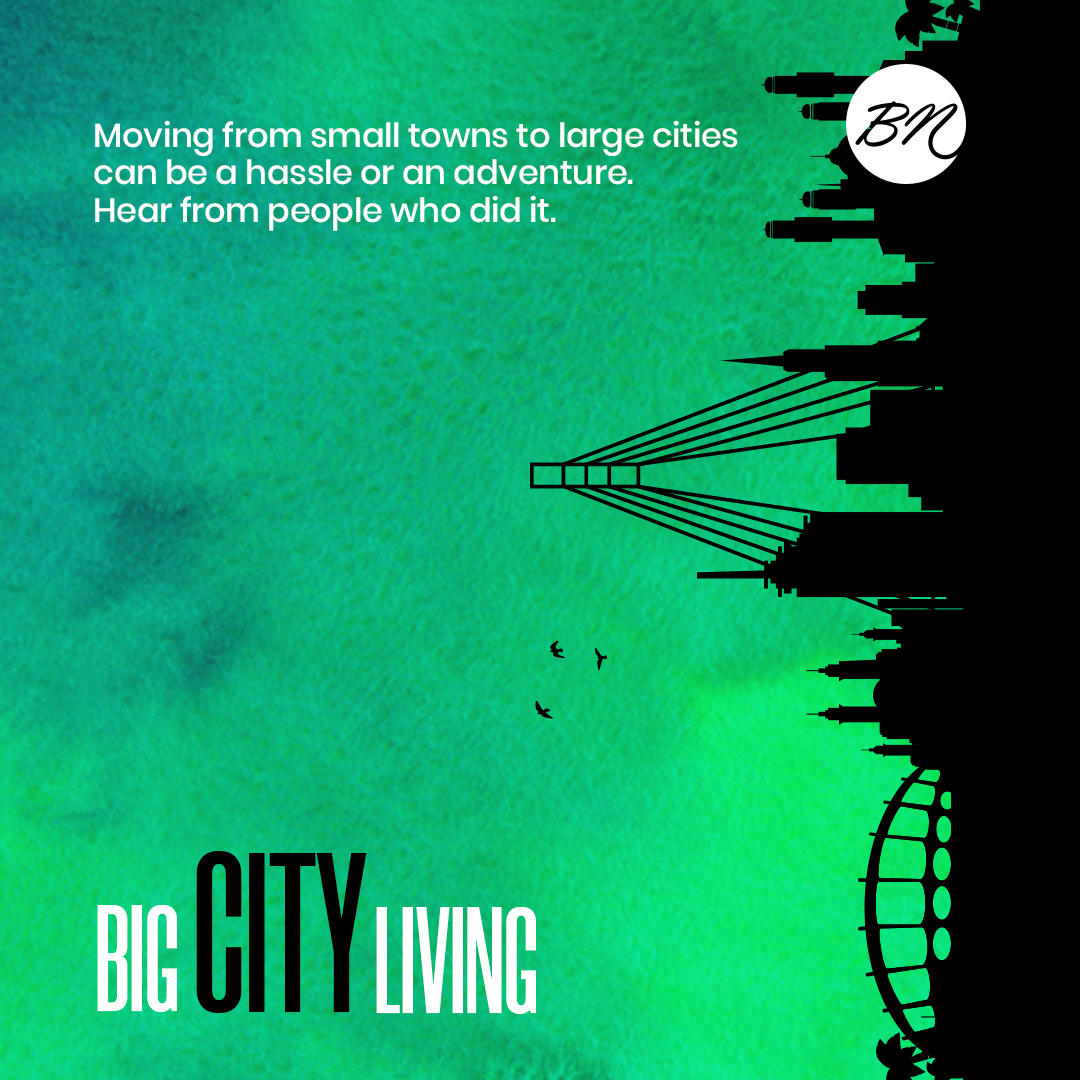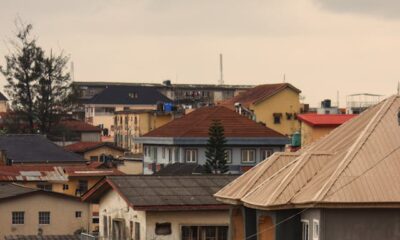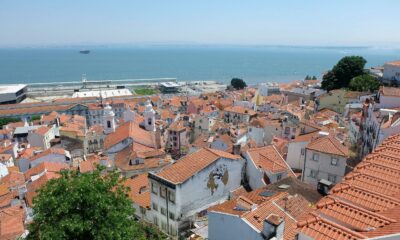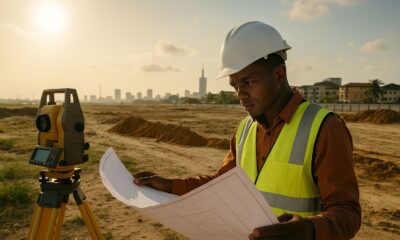Features
From Sapele to Warri to Onitsha to Lagos – Read Orunor’s Big City Living Story
Everything was weird in Lagos. In Warri, when you take a bus, the bus waits for you, and when they see there’s no passenger, they go. Lagos on the other hand, when they see you coming in, they hurry up, but when they see there’s no passenger, that’s when they’ll die there. And in Lagos, it seems like if you ask the next person a question, they’ll just eat you up. In Warri, everyone is chummy. You greet strangers, you see a woman passing and you say, Mummy migwo. But in Lagos, nothing.
Here’s Big City Living, a ten-part series where people who lived their childhood in small rustic towns share their experience of moving to big cities in adulthood. It’s something a lot of our parents did, something a lot of us are now doing.
Orunor, a creative designer who loves Lagos because he gets to find soft dodo, shares his serial-migration story with us.
From Sapele…
I was born in Sapele. I can’t say much about Sapele except Sapele water, which is basically alcohol. Also, there’s a lot of fish in Sapele. There used to be this Ibru Seafood. They were a seafood company that was storing fish, owned by the Ibrus. My father worked there as an accountant. We lived in a pretty exclusive area, GRA. It was really cosy. The only thing I can remember vividly is the landlord coming over to ask for my dad. I was pretty young. Every other thing is fuzzy.
I remember going to a primary school where every time we were in class, it was almost as if that’s when planes decide to pass. So we’d wait by the window and watch as they pass. That’s all I can remember. But it was a pretty chill place.
…to Warri…
Then we moved to Warri, I think in 1995. We moved to Okumagba, a place in Warri. Warri was a different ball game entirely. Coming from where we were coming from in Sapele, a quiet, cosy place where everyone was indoors. In Warri you’re seeing everyone bathing outside, and next thing you too you’re bathing outside. In Sapele there was constant light, but in Warri you’d see NEPA coming to climb pole. But maybe those things happened too in Sapele, and I didn’t experience them because I was very young and sheltered.
I had a tough time in Warri because my mum was like: You, you shouldn’t be speaking pidgin English like these kids. What’s wrong with you? This isn’t how I brought you up. But, man, it was in the blood. Mumsy did all she could to stop us from mixing. Sometimes we’d go out and she’d be like, You’re going to school. Don’t talk to anybody. When you’re coming back come back to the house straight. But it’s like she forgot that when you go to school, in class, everyone is speaking pidgin. The lingua franca was pidgin. Even people who default to their native language, once they get to Warri, they switch to Pidgin. English was for special occasions, like when you’re going to represent your school and you meet the governor.
Warri people build their houses in a way that—it’s not just face-me-I-face-you. It’s that, but they section the toilets to the back, as if it’s a separate house. You know, like when you’re trying to hide something. They build their toilets as if they’re trying to hide the fact that they shit. You visit someone and you want to take a shit and you ask, How far, guy, abeg where una toilet dey? And they point and tell you to go this way, then that way, then this way, then that way—they called it ekoro. But Warri was really good. It was really cool. There was this place they called Cinema Side. That was the only cinema in Warri, where we’d go to see new movies. It was really cool.
The food back then was ukodo. Urhobo man, small cold, breeze is just blowing, and he’s like I want to eat ukodo. Ukodo is that pepper soup that you make with unripe plantain.
…to Orhuwhorun in Udu…
Then Warri crisis drove us out. The Ijaw/Itsekiri crisis. I’m Urhobo, but when there’s war you don’t wait to find out if they’ll kill you too. So we moved to my dad’s town, Orhuwhorun, in Udu Local Government. Proper village. Trees everywhere, with constant light. We used to play rubber seeds. We’d go into the bush to look for rubber seeds. You gather everything together. Let’s say you have four round balls—they’re not balls, they’re almost ovally shaped—we gather them and make them into that configuration you’d find snooker balls in the beginning of a game. Then we stone them with one. As you roll it, it scatters. That’s the beginning of the game. Then you continue to roll, and any ball it hits, it’s yours. That was the game we were playing. Then suwe, and a bunch of other games. It was a village village. There were mud houses. There was a mud house opposite our house. But our house was really big. Monstrous. Well, was, because now I go and it’s like, What the f***?
We moved there and I did primary school. From there my dad moved me to the community high school. It was pretty weird because almost everyone knew my dad. My dad was active in the community. The major roads were tiny and tarred. But the others were just sand, and when rain fell it was a disaster. I remember going swimming in rivers. It was so cool. Until my mum beat the s*** out of me. She beat me that I ran away from home. This was after I’d moved to Ogun, Mayflower, for boarding house. You know how you’re in boarding house all year and you come back in December to hang with your friends. We went swimming in Okolosi River. But that’s another story. Koko is I ran away, returned at night, and when it was midnight she came to wake me up with cane, beat me until when it was time for morning devotion, said, Let’s go and pray.
It was in Mayflower I had a culture shock with the food. The first time I had amala was in Mayflower. They told us it was time for food and I went to the dining hall and saw this black thing. I thought, Oh, so it’s black eba.
…to Onitsha…
Onitsha was mad. When I got to the main market, Jesus Christ. It was mad. I almost got lost with my cousin. I’ve never been to a market that big. It was massive. The back was just water. A river bank. This was even earlier than Port Harcourt. I had just finished secondary school. Anytime I was on a break I’d look for an excuse to avoid Orhuwhorun because it was already getting boring. I went to Onitsha to visit my cousin. Onitsha was dusty as f***. So much red sand. Women riding bikes. That Niger Bridge first blew me away. It was enormous. In your face. And this was my first time travelling alone. The main market was huge as f***. Women almost like they were in competition with men for drinking. Man, Igbo women can flex. Do you know my cousin’s mother used to call me out at night that I should come eat fried meat with Gulder? Every night, without fail. I was like, Why are you people so jolly? My cousin might be introducing me to someone in Igbo that, Dis na my half brother from Warri. He just came. And the person would be like, Ah, nice one nice one. Welcome. Then call bartender and be like, Nne, bring one bottle of Gulder there. Take. Welcome. I thought Warri people liked parties, but man.
Then the houses in Onitsha. The way they build their houses, they make the top flat. Like a basketball court. They cement the roof of the house, and some of them will put hanger where they hang clothes. Some people will even go up there and sit, drink. That was another culture shock for me. But they were very lively. And they were quarrelling. I don’t know, maybe it’s the tone of Igbo, but it has a way of sounding aggressive, as if they’re fighting in the next compound.
Another thing that was a shock for me was how big the akpu wraps were. It was like your whole hand. See, if they stone you with it ehn. My favourite thing to do was just eat okpa sha. Every morning. It was also in Onitsha I had their black soup. Everywhere was just black. Even meat, everything will just be lost. Black.
…to Lagos…
Once I was done with my ND, I came to Lagos for my cousin’s marriage. This was before I began schooling in Benin. I learned to edit videos. We stayed at my aunt’s place in Shasha. That was when I knew I was probably going to move to Lagos. It was after the wedding that my cousin introduced me to a director, who taught me video editing. I shuttled between my cousin’s place, and the place of a senior of mine from secondary school who was also dating my sister at the time. I also learned how to design, waiting to resume at UNIBEN.
I left for Lagos because I felt I could do so much more here. Before I moved, in 2010, I was writing for 360nobs. I was a bit internet savvy at the time, using 2go, playing games. Then I stumbled on a post asking if people wanted to contribute, and I thought, Sure. By this time, I was terribly depressed. I just had a feeling that I would have to move. I knew that I could be so much more. I was in an environment where most of my agemates were either into cultism, getting somebody pregnant, or stealing. Or the ones who were really talented were trying to play football. It took a lot of effort to see beyond where I was. And thanks to my experience in Mayflower, I knew there was something out there. I knew that if I could just apply myself, I could do so much. That’s why I moved to Lagos.
I didn’t really move move until 200 level. I would say that was the year I moved to Lagos, when I knew that, I’m not going back home. That was when they went on strike and I sent my employers a dm on Twitter. I’d known there was something out there, but it didn’t happen until this connect.
I stayed in Berger. We were in Akiyode, living in one very funny estate that was waterlogged. Anytime rain fell we were done for. The place was a slope, and we were at the bottom. There was a canal by the side of our fence. We have mind in Lagos oo. Lagosians are numb. Because how did we stay in that kind of place? You are aware that a huge canal was just beside your house.
There was this experience of this guy who got a bricklayer to cement his entrance, barricaded everywhere with tiles, and he was like, Bros, I don take care of this water, nothing dey happen. That’s how the rain fell. The rain was entering our houses and he was like, Water don dey enter una house? Eeya. Pele oo. We slept. Woke up. We heard somebody shouting, My foam, my foam, my foam. Water, water, I no know where e pass oo. My foam. It was ridiculous. Water was coming out of our water closet. Two days after, he left. That was when I learned that, in Lagos, when you’re you’re looking for an apartment, you should go during the rainy season.
Everything was weird in Lagos. In Warri, when you take a bus, the bus waits for you, and when they see there’s no passenger, they go. Lagos on the other hand, when they see you coming in, they hurry up, but when they see there’s no passenger, that’s when they’ll die there. And in Lagos, it seems like if you ask the next person a question, they’ll just eat you up. In Warri, everyone is chummy. You greet strangers, you see a woman passing and you say, Mummy migwo. But in Lagos, nothing.
Anything that sets Lagos apart?
I didn’t get any shock per se until my first time on the Island. My first time on a BRT. Wow, what a life. I’d never seen those long buses in Warri, I’d only seen them in movies. Some people were sitting, some were standing. I was like, Eh. Nawa oo. They were moving in their own lane! I just sat down, taking it all in. When I saw the Third Mainland Bridge I was like, Wow. Wow. I’d never seen such a bridge in my life. Because we had this Udu Bridge in Warri, separating Warri from my town. But Third Mainland Bridge, I was like, What am I going to tell my people? My mind was in a constant state of amazement. I was going from, Oh, to Oh, to Oh, then Oh. I’d been in Lagos for about a month by this time. But just the Mainland, Akiyode to Oba Akran. I was just lost in sightseeing, big buildings, that I didn’t even know when they got to my bus stop. Luckily, I’d told the lady to let me know when they got to my bus stop.
There was one time I was in Computer Village, and some guys just touched me. They spoke Yoruba and told me to follow them. I was scared. My heart was on the floor. This guy said. Where are you going? I lost my voice. I’d gone to buy singlets and boxers, and these guys just stopped me and hit my chest. And the guy was like, where am I going? I should find him something. I was thinking. Should I run? What if I run and they chase me to one corner and kill me. That’s how they surrounded me. I think they collected 1k or 500 before letting me go. What was especially shocking was everyone was just walking past. Everybody. And I was like, Can you people not see the fear in my eyes? People who were selling stuff, people there to buy stuff, everyone was walking past. I was scared. It was like I was screaming silently and people did not do anything. I didn’t go to Computer Village for a while after that s***. Now, I realize, if I see the someone in that situation, I too will simply walk past. Numb republic.
And the difference between Lagos and all these other places?
Definitely how expensive it is to live in Lagos. You’re used to these places, and then you get to Lagos and it’s like, Pure water na ten naira? When we first moved to my dad’s hometown we were buying cellophane water ₦2.50k. Ice water. Then I came to Lagos and pure water was for ₦10.
I’d always take Lagos though. And for only one reason: opportunities. There’s really nothing for me to do in Delta state. If my father was working in Chevron or was a really big government personality, I would have stayed. If there was something there, I would have moved back. But I can’t. There’s nothing for me there.
Now I’m more concerned about what’s happening in the world. I know how to use the internet properly. I feel what Lagos did for me was it showed me more. I already knew there was more, but Lagos showed me what more was. Without Lagos, I don’t think I would have been as exposed as I am now. I probably would have ended up like one of my town boys. Playing draught, get somebody pregnant, buy okada or keke. It took me ahead of my peers from back in my town. Changed my orientation, how I saw life. For the level of exposure, the move has been worth it, but for the quality of life, no.
When I moved here in 2012, I went out with my boss. One of his friends had just bought a car, so they were celebrating. He shared his grass to grace story. So my boss told me something, he said, Orunor, this is the Lagos oo. This is the Lagos that you have come. This is it. What do you want? It can either break you, or make you. And it just stuck.



















